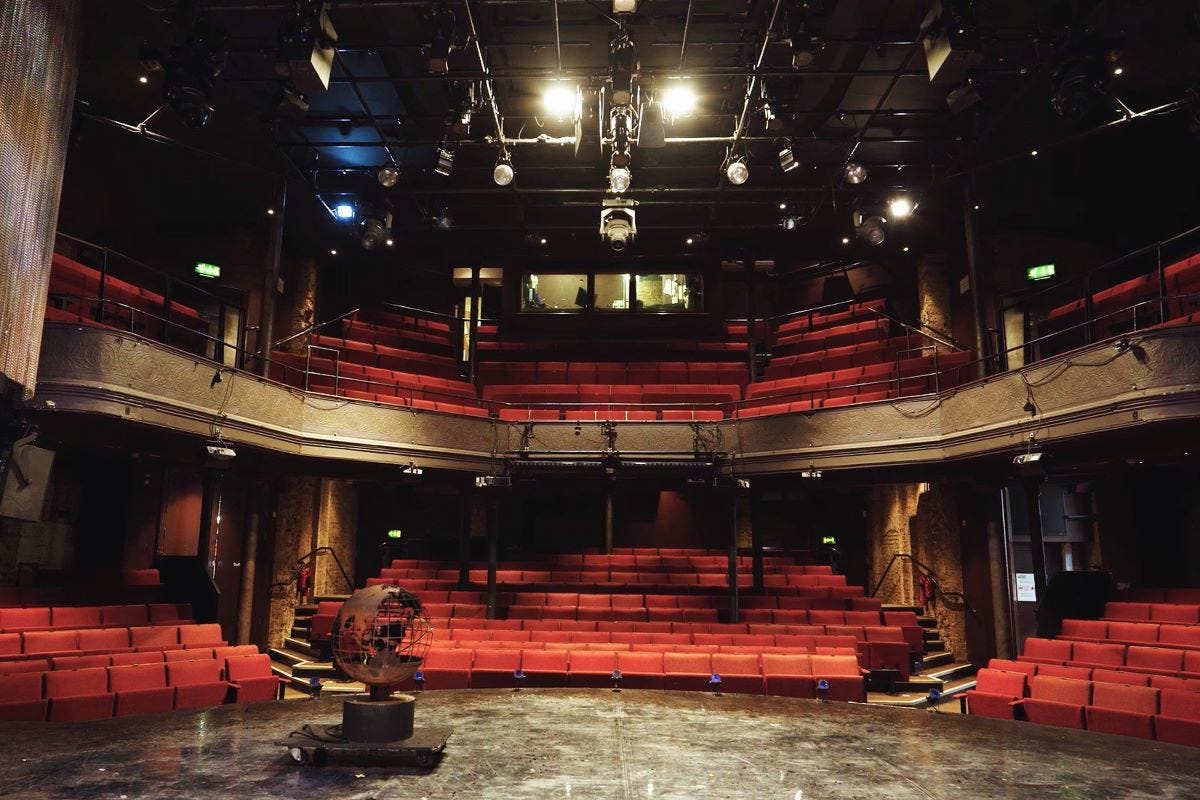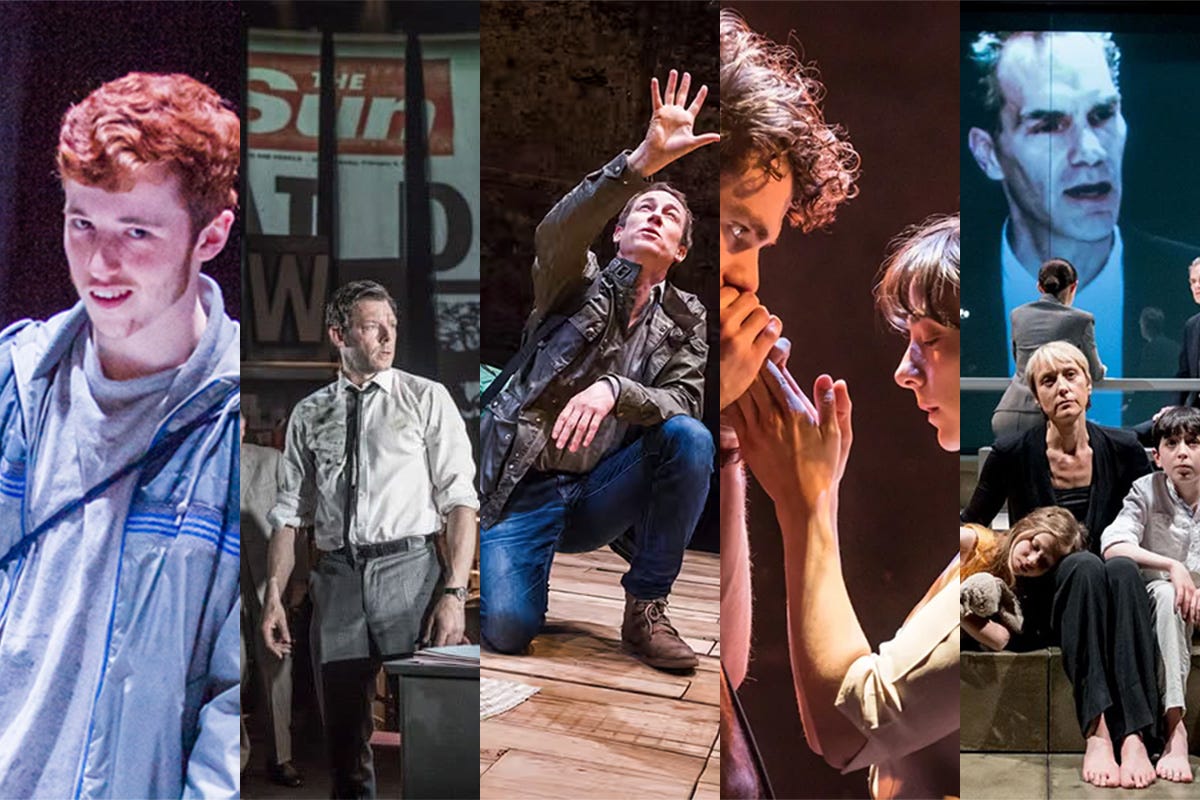Rupert Goold's reign at the Almeida Theatre has been remarkable
As he announces his departure for the Old Vic, I look back at Goold's sensational time in charge in Islington and list my top five productions of his tenure. Plus: three shows to see next week.
Hello, and welcome to The Crush Bar, a newsletter about theatre written by Fergus Morgan.
This is the free, Friday issue, which usually contains a Q&A with an exciting theatremaker or an essay on a theatre-related topic. This week, there is a bit from me about Rupert Goold’s reign at the Almeida Theatre, plus my top five shows from his time at the Islington venue. After that, there are your usual three show recommendations: two in London, one in Scotland.
In case you missed it, here is Tuesday’s issue of Shouts And Murmurs, which is a weekly round-up of the most insightful writing about theatre elsewhere for paid supporters of this newsletter.
Become a paid supporter of The Crush Bar - and help support theatre journalism - for 20% less.
Usually, becoming a paid supporter of The Crush Bar costs £5/month or £50/year. To celebrate the arrival of Exeunt on Substack, though, and because it is the time of year for deals, I am reducing that to £4/month or £40/year until the end of this weekend.
Both Exeunt and Natasha Tripney’s Café Europa are operating similar discounts right now. If you want to support the revival of independent theatre journalism on Substack, please consider subscribing to The Crush Bar, Exeunt, or Café Europa - or even all three at once!
There are a couple more things you can do to support this newsletter: you can share it with anyone you think might enjoy it and encourage them to subscribe, and you can use it for promotional purposes. There is more info about that here. Right, here comes the newsletter.
What have been the great reigns in modern British theatre?
Peter Hall at the National Theatre? Max Stafford-Clark at the Royal Court Theatre? Terry Hands at the RSC? Giles Havergal, Philip Prowse and Robert David MacDonald at the Glasgow Citizens? Nick Hytner at the NT? Ian Rickson at the Royal Court? Vicky Featherstone at the National Theatre of Scotland? David Lan at the Young Vic?
I would argue that Rupert Goold’s tenure at the Almeida Theatre, which will come to an end when he takes over the Old Vic in 2026, ranks highly on that list, perhaps top.
Every artistic directorship is different, just as every theatre is different. Each position comes with a unique set of challenges and opportunities, dictated by the theatre’s history, geography, architecture, governance, finances, personnel and more. Each job is, to quote Nicholas Hytner, a distinctive balancing act of pleasing loyal fans and attracting new ones, of satisfying audiences and challenging them, of working with established artists and cultivating emerging voices, of revisiting old collaborations and forging fresh relationships – and doing all that and more within the limitations of a budget and within the wider social, cultural and economic context of the time.
Running the National Theatre, for example, with its storied history, global reputation, big budgets, three auditoria and central London location during an era of generous public funding, is not the same as leading, say, Pitlochry Festival Theatre, with its remote setting, small subsidy, and rural audience through the harsh times of Covid.
Being a great artistic director means performing the particular balancing act required by a theatre well consistently over a long period of time. It is worth observing that not all great artistic directors will get the acclaim they deserve because not all theatrical balancing acts offer the opportunity to produce bold, flashy shows. There is greatness, for example, in revolutionising a theatre’s engagement programmes. There is greatness in overhauling its artistic development schemes. There is greatness in ensuring a theatre simply survives through the concurrent ravages of shrinking subsidy, spiralling inflation and a global pandemic. Greatness takes many forms.
The most obvious, most glamorous form of theatrical greatness is, well, putting on great shows, and doing so repeatedly, season after season after season. That, I think, is where Rupert Goold’s reign at the Almeida Theatre has been truly extraordinary. The numbers speak for themselves. During his eleven years in charge, the Islington venue has produced 67 main stage productions, fourteen of which have transferred to the West End and eleven of which have transferred to New York: a remarkable hit rate. Under Goold, the Almeida Theatre has been named London Theatre of the Year twice by The Stage and its productions have won nineteen Olivier Awards between them.
Goold himself has directed surprisingly few of these hits. He directed Mike Bartlett’s King Charles III (six Olivier nods, one win; five Tony nods) in 2014, James Graham’s Ink (four Olivier nods, one win; six Tony nods, two wins) in 2017, Bartlett’s Albion in 2017, Peter Morgan’s Patriots (three Olivier nods, one win; one Tony nod) in 2022, and Conor McPherson’s adaptation of Pawel Pawlikowski’s Cold War in 2023. Instead, they are the work of an evolving team that he has cultivated, including the actors Angus Wright, Juliet Stevenson, Lia Williams, the playwrights James Graham and Mike Bartlett, and the directors Yael Farber, Rob Icke and Rebecca Frecknall.
It is those last two that will be most associated with Goold’s time at the Almeida Theatre. Icke had worked with Goold in his previous position in charge of Headlong, but it was as his associate in Islington that he earned his reputation as a formidable adaptor and director of classic plays with Oresteia in 2015, Uncle Vanya and Mary Stuart in 2016, Hamlet with Andrew Scott in 2017, The Wild Duck in 2018 and The Doctor in 2019. I vividly remember approaching him in a pub after I had seeing Uncle Vanya to tell him how great I thought he was. He was, thankfully, just as awkward as I was.
Frecknall shot to fame with her 2018 revival of Tennessee Williams’ Summer and Smoke at the Almeida Theatre – I am pleased to say I interviewed her for The Stage ahead of that, when far fewer people knew her name – then followed that up with acclaimed stagings of A Streetcar Named Desire with Paul Mescal and Romeo and Juliet in 2023. Both Icke and Frecknall are now rightly recognised as generational talents in British theatre, and that is thanks to Goold’s platforming of them at the Almeida Theatre.
Sure, there were some duds along the way – I was disappointed by Richard Eyre’s production of Little Eyolf in 2015 and by Branden Jacobs-Jenkins’ The Comeuppance earlier this year, and it seems like no-one in New York liked 2023’s Tammy Faye – but I also keep remembering brilliant shows that have been forgotten about: Rachel Cusk’s Medea, Leo Butler’s Boy, Adam Brace’s They Drink It In The Congo, Ella Hickson’s The Writer, Jeremy O Harris’ Daddy: A Melodrama, Sam Holcroft’s A Mirror, Carrie Cracknell’s production of Portia Coughlan and Yael Farber’s of Macbeth and King Lear
And, sure, the artistic directorship of the Almeida Theatre was not the trickiest job in the world. The venue has a wealthy and loyal local audience, a catchment area that includes several million people, a long list of benefactors, a generous subsidy, a small and atmospheric auditorium that it easily sells out, and, thanks to previous directors Ian McDiarmid and Jonathan Kent, an international reputation that attracts the best and brightest stars. It is – and will be when Goold leaves – an extremely juicy job.
Despite these advantages, the scale of Goold’s success is still striking. Perhaps we should think of him as the theatrical equivalent of Matt Le Tissier, who only ever missed one penalty out of the 54 he took in his entire professional football career. Granted, from that distance you expect Goold to put it away, but to put it away time and time and time again is remarkable. It is the consistent quality of the Almeida Theatre’s output over the last eleven years that has made Goold’s directorship great. He will be much missed at the Islington venue. The Old Vic presents a totally different challenge - it is a far bigger space in a different part of London and gets no regular public money - and it will be intriguing to see what he achieves there.
The top five Almeida Theatre productions under Rupert Goold (that I have seen)
This list was extremely hard to put together. Honourable mentions to Cold War, The Wild Duck, and Albion, which I thought were all absolutely brilliant. That The Wild Duck and Cold War did not receive West End transfers is a great shame.
5. Boy
Sacha Wares’ production of Leo Butler’s play was unlike anything else I have experienced in a theatre. A relentlessly moving, occasionally faulty conveyor belt ferried a lonely teenager around London, where he was confronted by cold hearts and blank eyes everywhere he went. It was a damning indictment of austerity-era Britain.
4. Ink
James Graham doing what James Graham does best, taking a chapter of British history – in this case, the rise of Rupert Murdoch – and dramatizing it to resonant, riveting effect. Goold’s staging was slick and Bertie Carvel’s performance superb.
3. Uncle Vanya
I could have picked any number of Rob Icke’s Almeida Theatre shows. Andrew Scott’s Hamlet made me cry. The Wild Duck made me question everything. It was his rotating Chekhov adaptation that moved me the most, though. I can still feel the exquisite tension when Toby Menzies’ Astrov and Vanessa Kirby’s Yelena almost, almost kissed.
2. Summer and Smoke
The show that put Rebecca Frecknall on the map. Many critics thought Tennessee Williams’ rarely performed play was too challenging to stage. Who knew you just needed a semi-circle of seven pianos and a radiant Patsy Ferran to make it work?
1. Oresteia
This was the first Rob Icke show I saw and it remains the most memorable. A dramatically and intellectually gripping update of Aeschylus’ Greek tragedies. He made a 2500-year-old tragedy feel both faithful and totally fresh at the same time. The image of Angus Wright’s Agamemnon looming over the infant Iphigenia, contemplating killing her to appease his appetite for war chills me to this day.
What are your top shows from Rupert Goold’s time at the Almeida Theatre? Let me know!
Three shows to see next week
The Little Foxes - Young Vic, until February 8
Bad Sisters star Anne-Marie Duff appears in Lyndsey Turner’s revival of Lillian Hellman’s rarely performed 1939 play about wealthy, warring siblings on a plantation in the deep south of America, alongside a starry cast that also includes Mark Bonnar, Anna Madeley, John Light and Steffan Rhodri. You can read my interview with Rhodri - who also appears in the last ever episode of Gavin & Stacey this Christmas - in The Stage here, and you can get tickets for The Little Foxes via the button below.
Alice In Wonderland - Brixton House, until January 4
Devising company Poltergeist Theatre - which has made waves at the Edinburgh Fringe with its inventive shows Lights Over Tesco Carpark and Art Heist in recent years - first staged their contemporary twist on Lewis Carroll at Brixton House two years ago. Its tale of a modern-day Alice getting lost on the London Underground was a huge hit, earning this five-star review from The Stage’s Nikita Karia. Now, it is back in a bigger version. You can read an interview with writer and director Jack Bradfield in next week’s issue of The Crush Bar and, for now, get tickets via the button below.
Peter Panto And The Incredible Stinkerbell - Tron Theatre, until January 5
Johnny McKnight is the king - or should that be dame - of alternative Scottish pantomime. His spangly, saucy, class-conscious spin on JM Barrie’s much-loved tale first ran in Glasgow eleven years ago. It returns this winter with updated jokes - including a few barbed gags at the expense of the rest of the Scottish theatre industry - and an exuberant new cast. It is riotous fun. You can get tickets via the button below.
Episode five of my podcast A History Of Scottish Drama In Six Plays was released on Monday. It touches on the nine months when Scottish playwrights downed tools and went on strike for better pay, Glasgow’s year as European City of Culture in 1990, and the generation of theatremakers that emerged afterwards, focusing on Stephen Greenhorn’s 1997 play Passing Places. You can listen wherever you get your podcasts.
That’s all for this issue
That is it for this week. If you want to get in touch about anything raised in this issue - or anything at all, really - just reply to this newsletter or email me at fergusmorgan@hotmail.co.uk. Or you can find me on Twitter/X, where I am @FergusMorgan.
A quick reminder of the ways you can support The Crush Bar. You can share it. You can use it for promotional purposes. And you can become a paid supporter, which means you get an extra weekly email, Shouts and Murmurs, every Tuesday. There are currently 3531 subscribers, 112 of whom are paid supporters. If you would like to join them, you can do so above.
Fergus








